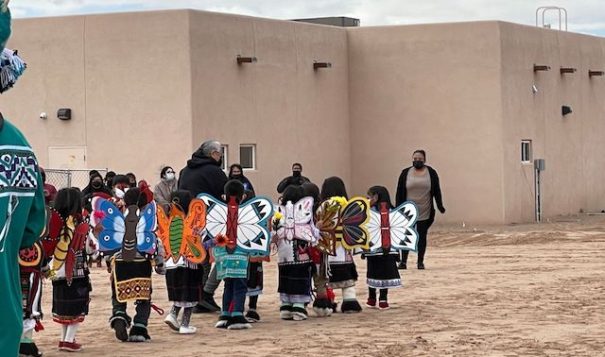News Based on facts, either observed and verified directly by the reporter, or reported and verified from knowledgeable sources.
“We don’t want to lose the language”
 Children from the Pueblo of Jemez's Early Childhood Program performing the butterfly dance on March 17. (Photo by Kalle Benallie, Indian Country Today)
Children from the Pueblo of Jemez's Early Childhood Program performing the butterfly dance on March 17. (Photo by Kalle Benallie, Indian Country Today)
JEMEZ PUEBLO LANDS— Jemez Pueblo in New Mexico celebrated Thursday, March 17 the groundbreaking of their Walatowa Early Childhood Learning Center. The Pueblo of Jemez is the only Pueblo that speaks the Jemez (Towa) Language.
The New Mexico lawmakers – who joined and worked with the Jemez Pueblo to provide $6.2 million funding for the center – included Gov. Michelle Lujan Grisham, State Sen. Benny Shendo Jr., and Rep. Derrick Lente.
“The center is the Pueblo’s top priority infrastructure project, as there is a great need in our community to provide a safe facility for early childhood education and language learning,” Jemez Pueblo Gov. Raymond Loretto said in a press release.
He said, at the groundbreaking ceremony, that he hopes the learning center will open in less than a year.
About 100 Jemez children, up to 5 years old, have participated in the Early Childhood Program’s full language immersion approach since 2013. The program is inclusive of Head Start and Child Care Services with all the teachers and child care providers fluent in the Jemez language.
“Our unique and valuable community-based education incorporates the community’s vibrant traditional calendar as well as art, music, dance, learning through movement, play, and exploration of our community and nature through science and math,” Lana Garcia, early childhood program manager, said.
Head Start teacher Gloria M. Tsosie, Jemez Pueblo, said the groundbreaking ceremony is an historical event.
“Especially to expose the children to this day and hopefully they’ll remember this occasion, and I’m grateful for the governor to have supported us all throughout the years and having our building built,” she said.
Tsosie added that she hopes the building will provide more classroom space and offer a variety of lessons based on the Jemez culture.
“There are some who pick up the language in no time, but they have progressed since we started the school year,” she said.
The occasion was also monumental because it was the first time the children performed a traditional dance since the pueblo’s lockdown two years ago.

Bertha Gachupin, Jemez Pueblo, has been teaching at Head Start for 20 years and was excited because they taught the children the butterfly dance in preparation for the ceremony.
She added that it’s important to teach the children the Towa language because they may live in households where it’s not spoken due to the parents not being able to speak it.
“We don’t want to lose the language,” she said.
New Mexico State Sen. Benny Shendo Jr., said there is an opportunity for a ripple effect.
In 2012, the Jemez Tribal Council converted their Walatowa Head Start to full language immersion. Then four years later, the National Office of Head Start, under the U.S. Department of Health and Human Services revised their performance standards to allow language programs to teach in their Native languages and no longer require English as a medium of instruction.
The Jemez Pueblo’s Full Language Immersion Program was then able to be funded fully.
“So now every tribe that chose to do what Pueblo Jemez did in 2012 can now use the Head Start funds to do their own language immersion as well,” Shendo said.
Earlier this year, Gov. Grisham’s fiscal year 2023 executive budget recommended $1.4 million to the Early Childhood Education & Care Department and $10.2 million for programs like New Mexico Indigenous Languages initiatives, Native Language Database and Grow Your Own Indigenous Language Teacher Pipeline.
And on Feb. 15, the New Mexico legislature passed House Bill 60 that requires school districts to pay Native language and culture teachers the minimum salary as level 1 licensed public and charter school teachers.
Grisham said that many other tribal nations will be able to celebrate these groundbreakings all over the state.
“When we teach our cultural ways and traditions, our languages, where we support our children and our families to have all that is available, every single opportunity will lay itself in front of our children and our families,” she said.
###
Indian Country Today, a nonprofit and multimedia news enterprise, is a spacious channel that serves Indigenous communities with news, entertainment, and opinion. Support Indian Country Today for as little as $10.
